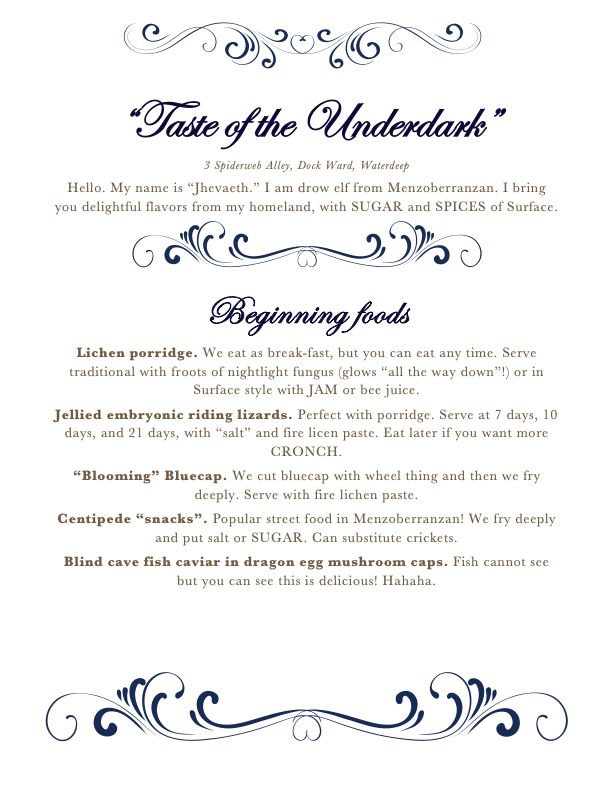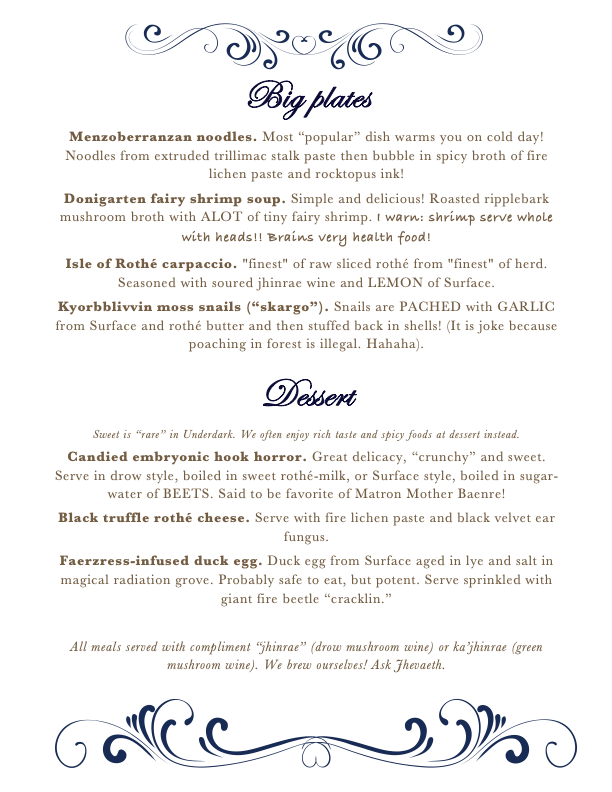This is part twelve of a multi-part series exploring how I, Lise, see the drow of D&D. For more info, see part 1’s introduction. Also worth reading is the post where this all started: “On making the drow less problematic.”
Additional note: currently I have limited arm movement due to an injury. Thankfully I wrote a lot of these ahead of time. Please excuse any textual infelicities that may result.
- Introduction + the banality of evil and social Darwinism
- The law of “don’t get caught”
- The ultimate in “guess” culture
- Chosen ones
- Connoisseurs of sensual pleasures
- Sexual orientation
- Gender identity and trans-ness
- Yes, heat vision
- Drow language
- Consent in the matriarchy
- No one is born knowing their society is fucked
- Drow cuisine (you are here)
- Etc etc
Weird: it’s what’s for dinner
Of all the aspects of my drow headcanoneering, drow cuisine is the one I have the most fun with. I have spent entirely too long imagining what kinds of foods the drow would have access to, living in a lightless underground world with a very different ecology than ours.
In fact, in my abbreviated Waterdeep: Dragon Heist campaign, I played Jhevaeth, a drow chef (and, you know, arcane trickster rogue, too). This culminated in my creating an entire menu for Taste of the Underdark, his restaurant in Dock Ward. It includes riding lizard balut, fire lichen paste, and bar snacks of fried centipedes… and a lot of butchered English Common.


To sum up the themes here:
- Mushrooms — nobody is surprised. And canon has seen fit to provide us with many different Underdark mushrooms, including trillimac, dragon’s egg, ripplebark, nightlight, zurkhwood, and many more.
- Lichens. Which implies some algae, as well. (I believe “fire lichen” is canonical, too).
- Real- world cave or dwelling insects, eg. crickets, centipedes. No spiders, of course, because drow revere them. (Which, surprisingly, is not canonical? See the Ed Greenwood video at the end of the post).
- Other real-world wild cave/underground critters, eg. blind cavefish, snails, fairy shrimp.
- Fantasy cave/underground critters: eg. hook horrors, rocktopus.
- Some domesticated livestock, too — rothé (Underdark cow-like cattle) and riding lizards. Also cheese made from rothé milk!
- “Crock foods” — things that require (long) periods of sitting in containers, eg. the faerzress-infused duck egg, based off the Chinese “century egg.” Because when you live for 800 years, what’s a year or two among friends?
- Embryonic creatures. I’m not sure I have a good canonical reason for this, except that (as I mention below) it fits in the general theme of “weird.” But maybe I chose it because the drow don’t strike me as being squeamish about eating something that looks like a baby lizard.
- Not much sugar. I get into this in detail below.
- Spice. If you don’t have much sugar (and you definitely don’t have “everything nice” 🤣), then you have to have spice, right?
Does some of that sound “weird” and “gross” to you? Well, that’s kind of by design. As I mentioned in my original post, the alienness of the drow is what I find so fascinating. So I wanted to pick foods that not only reflected the circumstances in which the drow live, but which also sounded alien to a (Western) palate.
(I also took some inspiration (again!) from the Dunmer of The Elder Scrolls, who have foods such as scuttle, a cheese-like substance made from insects).
But, let us remember, none of the foods on this menu are truly “weird” or alien — they’re reflective of many different real-world cuisines. Caviar is Russian, escargot is French, balut (embryonic chicken or duck egg) is Filipino, and the century egg is Chinese. Noodles are found in many different cultures, and spice is appreciated in many. Many cultures also eat insects.
Ultimately, as I said, drow are ruthlessly practical, and so are their food choices.
Candy is dandy
One conclusion I came to early in my drow cuisine headcanoneering: sweets are quite rare in the Underdark. This is because sugar is mostly a product of photosynthesis. (Wooo splitting hydrogen bonds with the power of light!)
It’s not entirely nonexistent, though — I can see a few different sources of sugar that might occur naturally in the Underdark:
- At least in the real world, mushrooms do contain small amounts of sugars (I talk about the exact quantity in the next section).
- One assumes the aforementioned rothé milk contains lactose. (Probably not in as great a quantity as IRL, since there would be less in the food they consume).
- Some fungi produce what is called “guttation,” a watery substance that appears spontaneously on their surface. That guttation can contain small amounts of sugar, as well as some secondary metabolites. (In fact, penicillin is the guttation of of Penicillium mold!
However, the sugar content in all of these options is so low that you’d need to start with massive quantities of the substance and condense it down — similar to how maple syrup is made IRL, where ~40 gallons of maple sap is required to produce a gallon of syrup.
But there’s an easier way for the drow to acquire sugar — to steal it from the surface:
“Where does one get sugar in the Underdark?” Gaulir asked, asking the question that was already on Mavash’s mind. “Doesn’t it mostly come from surface things? Honey from bees, sugar beets, sugar cane down in Calimshan… what am I forgetting?”
Jorlan dropped his eyes to his plate, looking apologetic. “Surface raids, I’m afraid. And then, well, anything can grow under a Daylight spell. I’ve had orders before to tear up fields of… what do you call them? Dark green leaves, red roots?”
Gaulir nodded. “Sounds like sugar beets to me.”
Bright Future, chapter “Jhinrae”
Either way, sugar is definitely a luxury good, probably limited to the nobility. It’s probably the kind of thing you serve when you want to impress someone at a banquet. Before murdering them, of course.
But liquor is quicker
Given the relative lack of sugar, what about alcohol? The Drow conlang gives us the word “jhinrae,” which means “wine.” But… how do you ferment anything without sugar?
Hooboy. I went down a rabbit hole here.
As I suggested above, mushrooms aren’t a great source of sugar. There are only about 1.1g of sugar per cup (250g) of mushrooms, or 0.4% of the total mass. It requires ~17 grams per liter to produce 1% alcohol. So if you wanted to produce a liter (~3.7 gallons) of 10% alcohol — the alcohol level of a typical white wine — you’d need about 187 cups of mushrooms.
… that’s a lot of mushrooms.
Now, that’s for yeast fermentation. Lactobacillus (bacteria) fermentation is easier — and is indeed used to ferment mushrooms in some cuisines! But lacto fermentation produces more lactate (lactic acid) than it does alcohol. This is why lacto fermented foods like yogurt or kimchi are sour, and also why kombucha only has 1-2% alcohol content.
I did find a recipe online for mushroom wine! But it adds buttload of sugar — 2 cups of cane sugar per cup of mushrooms. It’s less mushroom wine and more “wine with notes of mushroom” at that point. (Still, I gotta try making it!)
Also, I doubt you can just buy packaged yeast (or lactobacillus) in the Underdark🤣 Sure, the drow could collect yeast/bacteria in the wild and refine it. But in the real world that was a rather recent development; we used wild yeast and bacteria for fermentation long before that, i.e. “leave fruit outside and watch the magic happen.” This depended on what yeast/bacteria existed already on the fruits/grains or in the environment.
Wild fermentation is quite unpredictable — leading to spoiled or sometimes even explosive results! — which is why we mostly don’t do it any more. (Even sour beers, which were originally wild-fermented, are mostly kettle soured these days by adding lactobacillus in a controlled environment). Wild fermentation thus seems fitting for any culture in a low-tech high fantasy setting — especially one as focused on chaos as the drow!
So as a conclusion to Entirely Too Much Research into fermentation, I think “jhinrae” is lots of luxury sugar + wild yeast/bacteria fermentation.
I think the most apt way to close this post is with this video from Ed Greenwood about drow foods. I was surprised the extent to which his ideas aligned with mine — how’s that for canon support for my wild imagineering? 😆
Next time: my “etc etc” post, which will contain a bunch of different one-off things I’ve invented (or borrowed from fanon) for the drow.